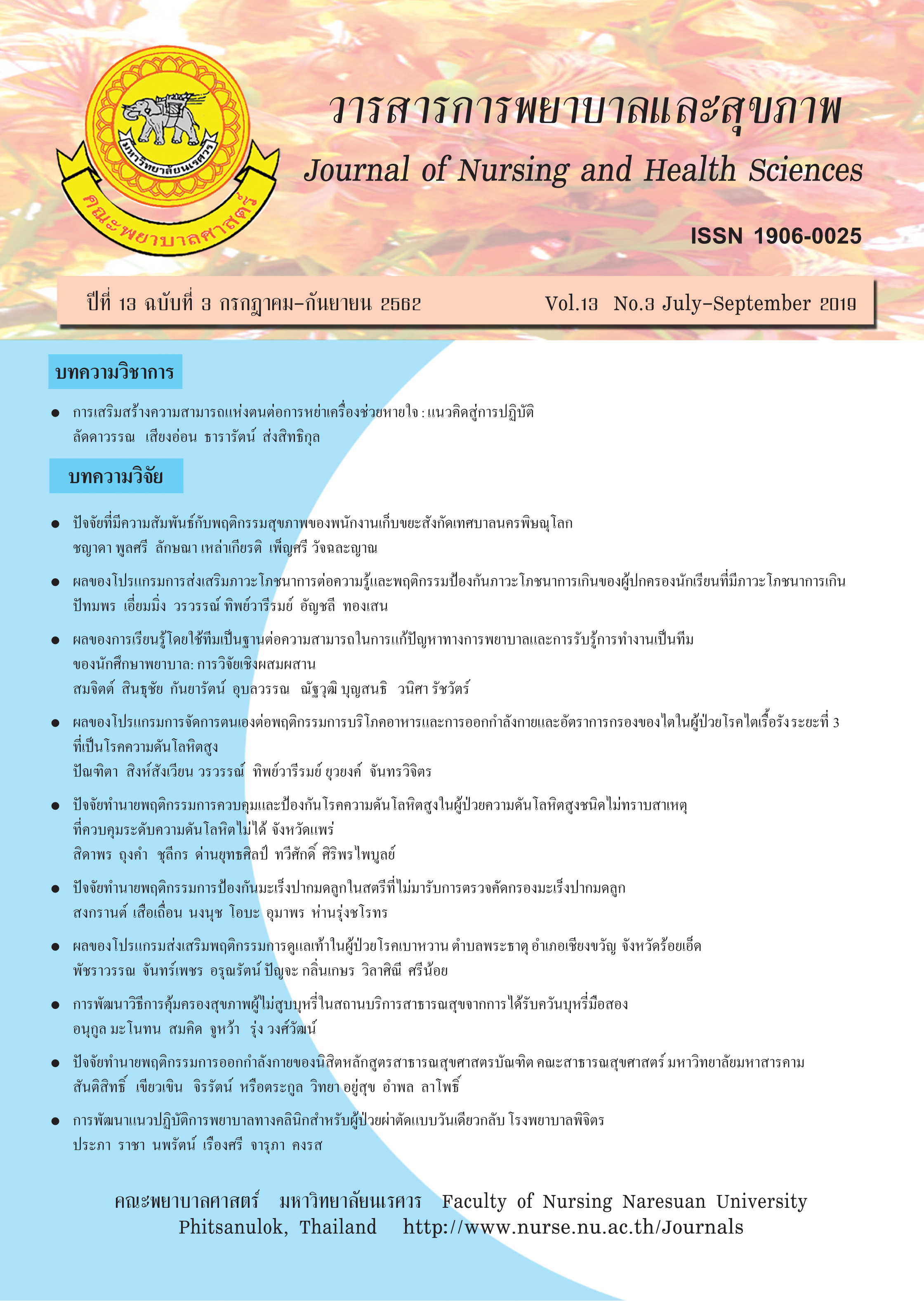The Effect of Self-Management Program on Food Consumption Behavior and Exercise and Glomerular Filtration Rate among
Main Article Content
Abstract
The purpose of this quasi - experimental research was to study the effect of seft - management program on food consumption behavior and exercise and glomerular filtration rate among chronic kidney disease stage 3 patients with hypertention. Sample were 46 among chronic kidney disease stage 3 patients with hypertention aged between 50 - 70 years old. Purposive sampling method was used to recruit the participants who were assigned into the experimental and control group, with 23 participants each group.Participants in each group were matched by gender, age. The experimental group received 12 week education based program. While the control group received routine nursing care. The instruments were seft - management program, a food consumption behavior and exercise questionnaire, and a record of the estimated glomerular filtration rate of each patient. The content validity and reliability were 0.86 and 0.69, respectively. The data were analyzed by descriptive statistics, paired t - test and independent t - test.
The results of the study revealed that the after received a self - program mean score of health behavior on food consumption behavior, exercise behavior and total behavior significantly higher than before intervention. The experimental group resuits wear also significantly higher than those of the control group (p<.001). Furthermore, the average estimated glomerular filtration rate of the experimental group after participating in the program were significantly higher than Pre – intervention (p<.001). The comparison between the experimental and control group for average estimated glomerular filtration rate were even more significantly, in that, while the pre - intervention rates of each group were the same.
These results showed that participation in a self - management program result in food consumption behavior and exercise and the improved glomerular filtration rate of the patients. Therefore this program can be used as a guide to change self - management behavior among chronic kidney disease stage 3 patients with hypertention.
Article Details
References
Apinya, T. (2016). Operating manual for the operation of chronic kidney disease reduction in diabetic patients and hypertension. Nonthaburi: The War Veterans Organization of Thailand. [In Thai].
Chadthai, Y. (2010). Medical-surgical nursing. In P. Srimorakot, (Ed.), Nursing care for adults and elderly people with health problems (pp. 474-475). Bangkok: I Group Press. [In Thai].
Department of Mental Health. (2018). Mental health articles. Retrieved 28 March 2018 from https://www.dmh.go.th. [In Thai].
Jopa, R., Suntayakorn, C., Prachanban, P., & Wanitchakorn, N. (2010). Effects of self-management program on controlling metabolic syndrome among middle age people. Journal of Nursing and Health Sciences, 4(2), 36-45. [In Thai].
Kaneidde, w. (2016). Exercise for chronic kidney disease patients. In S. Kantachuvesiri, (Ed.), Textbook of chronic kidney disease (pp. 691-697). Bangkok: Tex and Journal Publication company Limited. [In Thai].
Kanfer, F.H., & Gaelick – B.L. (1991). Self–management methods. In F.H. Kanfer & A. Goldstein (Eds), Helping people change: a textbook of methods (4th ed.) (pp. 305-360). New York: Pergamon Press.
Kham-ai, P., Suntayakorn, C., Pachanban, P., & Tunsupasawasdeekul. (2015). Effects of self - management program on health behavior and functional capacity of chronic obstructive pulmonary disease patients. Journal of Nursing and Health Sciences, 9(1), 162-171. [In Thai].
Khansanei, P., & Tangsanga, K. (2016). Epidemiology of chronic kidney disease and scope of problems in Thailand: burden of disease and economic impact. In S. Kantachuvesiri, (Ed.), Textbook of chronic kidney disease (pp. 17). Bangkok: Tex and Journal Publication company Limited. [In Thai].
Kulprasuthidilok, P. (2009). Caring for kidney disease patients. Bangkok: Tathata Publication. Co., Ltd. [In Thai].
Health Center Nakhonsawan Province. (2016). Health data center. Retrieved 3 December 2016 from http://www.nswo.moph.go.th/main/hdc-page/. [In Thai].
Mauengree, P., Tangkawanich, T., & Junwijit, S. (2014). Effects of self - management program on health behavior and LDL- cholesterol level in elderly with risk of dyslipidemia. Journal of Nursing and Health Sciences, 8(1), 72-81. [In Thai].
Mental Health Strategy and Planning Division Office of the Permanent Secretary Ministry of Public Health. (2017). KPI template. Retrieved 19 January 2017 from http://bps.moph.go.th/new_bps/. [In Thai].
Ministry of Public Health. (2016). Health data center. Retrieved 3 December 2016 from https://hdcservice.moph.go.th/hdc/main/index_pk.php. [In Thai].
Moungyeam, S., Naewbood, S., & Rithpho, P. (2018). Effects of health promotion program on health behavior and estimated glomerulus filtration rate among patients with chronic kidney disease stage 3. Journal of Nursing and Health Sciences, 12(special), 97-107. [In Thai].
National Kidney Foundation. (2002). K/DOQI clinical practice guidelines for chronic kidney disease: evaluation, classification, and stratification. American Jounal of Kidney Disease, 32(2), 43-45.
Nephrology Society of Thailand. (2015). Clinical practice recommendation for the evaluation and management of chronic kidney disease in adults 2015. Bangkok: Nephrology Society of Thailand; 2015. [In Thai].
Ruangkanchanasetr, P. (2012). Chronic kidney disease. In B. Satirapod, (Ed.), essential nephrology (pp. 375-399). Bangkok: Nam Akson Printing House. [In Thai].
Seephom, S., Prapaipanich, W., Janepanich, P., & Pichaiwong, W. (2014). The effect of self - management program for slow chronic kidney disease progression on knowledge health behavior and blood pressure levels. Thai Journal of Cardio-Thoracic Nursing, 25(1), 16-31. [In Thai].
Sirivong, T. (2007). Hypertension and chronic kidney disease, In T Sirivong, (Ed.), update on chronic kidney disease prevention: Strategies and practical points (pp. 154-155). Khonkaen: Khonkaen University Printing House. [In Thai].
Srisatidnarakul, B. (2014). The methodology in nursing research. Bangkok: U and I Intermedia. [In Thai].
Suphapu, N., & Jantarawijit, Y. (2017). Effects of self – regulation program with exercise on blood pressure in elderlywith essential hypertension. Journal of Nursing and Health Sciences, 11(3), 70-80. [In Thai].
Thanakitcharu, P. (2015). Current situation of chronic kidney disease in Thailand. Department of Medical Services Journal, 40(5), 5-18. [In Thai].


